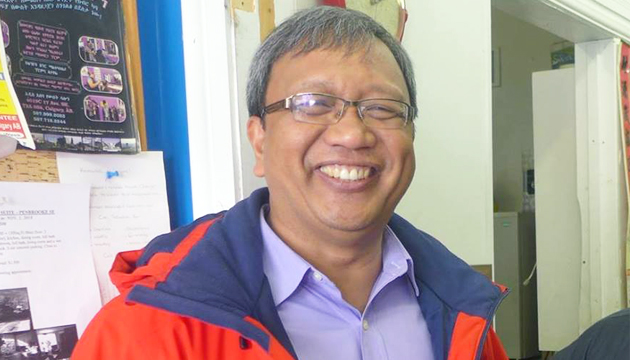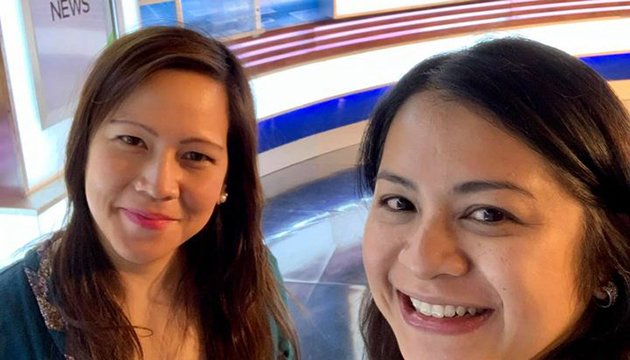December 16, 2024 — Alden Habacon, well-known as a diversity and inclusion educator in the Canadian Filipino community, has passed away at the age of 50.
Canadian Filipino Net is republishing a story from Living Today Magazine’s March 2011 issue where Habacon was featured as an emerging leader along with other young movers and shakers in the Canadian Filipino community.
As one of the trailblazers building bridges in a fractious Canadian Filipino community that is slowly coming together as a whole, Habacon will surely be missed. He died on December 2.
Identity beyond ethnicity
By Emmy Buccat
Fitting into Canada’s complex cultural mosaic has always been a challenge for most new immigrants. The challenge is not so much about adapting and integrating, but more about searching for a real, palpable ethnic identity.
“When I was young, I always struggle about wearing my Asian identity everywhere I went. I was born in the Philippines but I grew up in Regina. I no longer have an accent. My understanding of Philippine language, history and culture is quite limited. So how Asian am I really to be saying that I am Asian-Canadian?” Alden Habacon recalled in his early musings.
“We are not really defined by our ancestry anymore. We are more of a collection of cultural things that we do or the cultural spaces that we occupy,” said Habacon who started as a volunteer visual arts editor of a Vancouver-based magazine Ricepaper.
The Simon Fraser University fine arts graduate eventually established Schema Magazine, an online magazine platform that reflects the perspective of second-generation Canadians. His thoughts on being a “cultural navigator” for a new Canadian mainstream with the ability to effortlessly interface with a complex web of mixed cultures actually paved the way for him to become some sort of a diversity guru.
“My work at Schema about the new concept of cultural identity got me into the radar of the Canadian Broadcasting Corporation (CBC) television. They initially hired me as a consultant -- then it became a part time job, which turned into a full time job eventually evolving into a role as manager for diversity initiatives,” Habacon said.
For five years, he worked on CBC's development and implementation of around 300 initiatives reflecting Canada's diversity through programming and hiring activities.
“The culture change that I was trying to initiate is for management to own and embrace my file so much that I could go and become redundant. My initial thought was if in five years, I’m still at CBC, I should quit because I wasn’t effective. I would have been just an administrator not a change agent,” Habacon said.
In December 2010, Habacon was appointed as director of intercultural understanding strategy development at the University of British Columbia (UBC) to help develop and lead the early implementation of the university’s commitment to intercultural understanding.
“In broad strokes, what we are hoping to do is to move UBC from being a very successful multicultural campus to becoming a successful intercultural campus,” Habacon said.
Multiculturalism, he said, is making sure that an ethnic community can preserve their language or culture but, he emphasized, the ability to create, weave or connect different cultures together is interculturalism.
“Often, when people say I am so proud of Canada’s multiculturalism, I think what they actually meant is Canada’s interculturalism. We haven’t been using this term. That is why I started using multiculturalism 2.0 as the evolution of multiculturalism beyond ethnicity, beyond just celebrating traditions, culture or dance. It does not mean that the culture is going to be diluted, it just means we are creating something new and innovative,” Habacon added.
Habacon is also executive director of the Laurier Institution, a national non-profit organization committed to the study of Canadian diversity from its economic benefits to its social implications.
“If you are from the Philippines, you tend to associate or go to the Filipino community which absolutely makes sense. Initially, it is an incubator but if it grows to become an ethnic clique then it becomes a barrier.
“You don’t learn the slang; you don’t learn the verbal and the non-verbal language of the mainstream Canadian. You need intercultural literacy; intercultural fluency and intercultural network to become more successful in the Canadian workplace,” Habacon stressed.
Habacon is also an active member of Responsive Society of Professionals for Empowerment and Collective Transformation (RESPECT), and the Alliance of Filipino Associations (AFA).
“RESPECT is about helping old and new Filipino immigrants move into the next level. But how can we move into the next level, socially, economically and politically if we are not interconnected? Everybody wants to do something new and yet we are competing for the same audience. We know we have the kababayan spirit but crab mentality is still there too. That is the issue being addressed by AFA spearheaded by Mable Elmore,” he said.
“Social change can only happen if we learn the language and the rhythm of the place where you want the change to be in”, he added.














